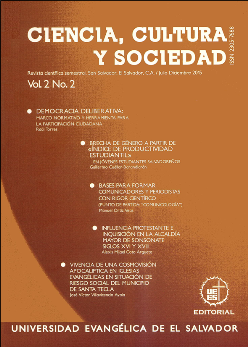Deliberative Democracy: Legal Framework and tools for civic participation
DOI:
https://doi.org/10.5377/ccs.v2i2.2916Keywords:
Politics, democracy, deliberation, consensus, public space, El SalvadorAbstract
This Project is aimed at contributing to the growth of political culture of dialogue for peace. To do this, a historic, conceptual and evaluative framework on deliberative democracy is presented, as a horizon for a political culture of dialogue and peace. A concrete case is evaluated, that of a public space convened by the Government of the Republic (Economic and Social Council 2009). As a result, a set of variables that would allow for the creation of indicators for the follow-up of future experiences are recommended. For this purpose a qualitative exploratory methodological approach is adopted to propose and document a model of democratic and “deliberative” politics, from which some experiences of social and political dialogue in El Salvador are evaluated, from 1970 up to the convening in 2009 for the formation of the Economic and Social Council by the Government of the Republic. As a result, there is a basic outline of the main ideas on the views of democracy that serve as the framework for the exercise of an active citizenship; an assessment of the experience of the ESC as a forum for debating national issues such as taxation, so that even though no agreement is reached, it generates an important experience to continue future conversations; and finally, there is a proposal for the creation of tools for the monitoring (assessment) of the quality of the deliberative and democratic processes.
Revista Ciencia, Cultura y Sociedad Vol.2 No.2 July-December 2015; 9-27
Downloads
1118
Downloads
Published
How to Cite
Issue
Section
License

This work is licensed under a Creative Commons Attribution-NonCommercial 4.0 International License.
The authors give to the copyright to the journal Ciencia, Cultura and Sociedad, and copyright in all forms and media, to be notified of acceptance of your article. The authors can publish their articles in another journal after a semester published in this volume. The content of the articles is the sole responsibility of the authors. To refer to the articles correctly quote the authors.

Ciencia, Cultura y Sociedad articles are published in open access and are under a Creative Commons Attribution-NonCommercial 4.0 International License.

